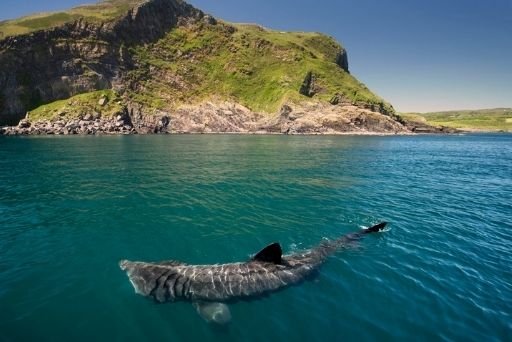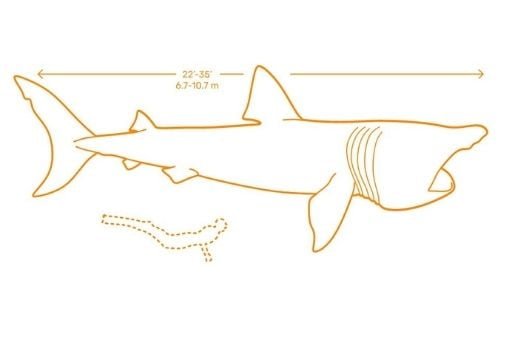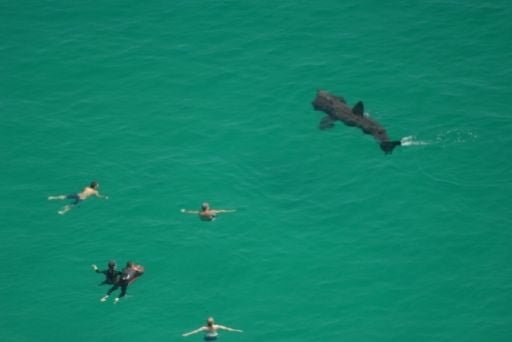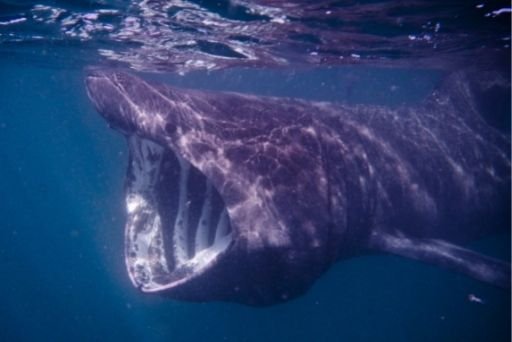7 basking shark facts to leave you surprised
Unlike most Sharks, Basking Sharks are peaceful creatures that neither prey on other marine animals nor harm humans. However, they might give you intimidating impressions but no need to worry.
Today, they are one of the most endangered animals on the planet for several reasons. Overfishing, Hunting, and entanglement of these fishes have led to this crisis in these animals.
However, here is everything you need to know about these unusual animals underwater!

1 – They are not basking for real
Most people assume that the basking sharks are basking in the sun when they appear to move slowly underwater. However, that is not true. These creatures do so for filtering food. Initially, people often mistook them for sunfish as they were seen floating on the surface of the water. However, it was later that these species were renamed Basking Sharks for people to differentiate them from sunfishes.

2 – Basking Sharks have a massive body
They are huge and can look as big as a whale. Their bodies are nearly 32 feet long with a weight between 6,000 to 13,000pounds. They have a conical snout and gill slits that extend entirely from their bottom to the top. Although basking sharks look huge, their teeth are tiny. However, the teeth are in hundreds and hooked.
But they have large livers that make up 25% of their body weight. It is their liver that helps these sharks to float and not sink.
When they are born, basking sharks are as long as 5 to 6 feet. They may also grow to be 16 to 20 feet later when they mature. They also have a massive mouth that even surpasses their eyes.

3 – They are filter-feeding sharks
The basking sharks are filter-feeding animals like the megamouth shark and whale shark. Usually, they have their mouth wide open in search of food which helps them intake an ample amount of water. The food they intake occurs by gill rakers to the gill slits. They can strain up to 2,000 tons of water per hour. Zooplanktons like Crustaceans, fish eggs, larvae, and invertebrate larvae are their daily menu. So, they do not have a very varied food menu after all.

4 – They are highly immigrational animals
Unlike other sharks, basking sharks like to travel in groups and alone as well. Scientists are still trying to understand why they have a combination of whale and shark behavior altogether, but for now, it is unknown.
They also travel a lot, and during winters, you may not be able to see them at all. So, they may go to deeper parts to find food. So, they may even attract a mate during these times, which they can do very well. Most people also believe that when these sharks travel around in circles, they are trying to attract other female basking sharks for mating.

5- They are coastal-pelagic species
You can mostly find basking sharks across the world’s temperate waters and arctic waters. The western Atlantic may vary from Newfoundland to Florida and the southern from Brazil to Argentina. You may find them in the eastern Atlantic region from Iceland to Senegal and the Mediterranean as well.
You can also find them in the Western Pacific regions of Japan, China, and the Koreas. The eastern Pacific region is located in the Gulf of Alaska, California, and Ecuador to Chile. Thus, these sharks are widespread in American parts of the world.

6 – Their breeding is unusual
The female basking sharks may delay their gestation period to remain pregnant for 1 to 3 years. Mating usually occurs during the summers, and the females often move from one location to another to swallow water when they are all set for their babies to be born. Approximately six pups may be there that grow as big as 6 feet in the start. They may also mature to be 16 to 20 feet long. These sharks can continue to live for 50 years and more in some cases.

7 – High endangered species
Today, basking sharks have become one of the largest endangered species due to Hunting, overfishing, and so many other reasons. Its large liver is sold in Japan and is used in the lamps by fishermen in the U.K. Since they take quite a long time to mature, they are becoming endangered in no time at all.
There has been a report that the population of these sharks has decreased by 80% since 1850. Such statistics are raising concerns for their species with each passing day.
Basking Sharks are unusual shark species that pose no threat to the environment around them. That is why we must preserve their being.




